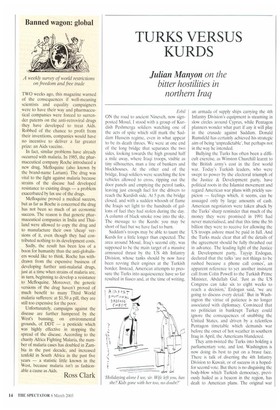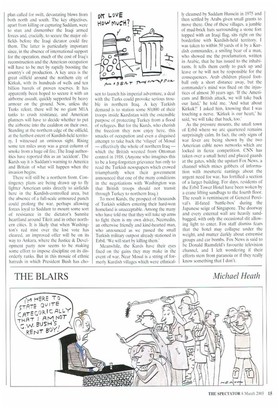TURKS VERSUS KURDS
Julian Manyon on the
bitter hostilities in northern Iraq
Erbil ON the road to ancient Nineveh, now signposted Mosul, I stood with a group of Kurdish Peshmerga soldiers watching one of the acts of spite which still mark the Saddam Hussein regime, even in what appear to be its death throes. We were at one end of the long bridge that separates the two sides, looking towards the high ground half a mile away, where Iraqi troops, visible as tiny silhouettes, man a line of bunkers and blockhouses. At the other end of the bridge, Iraqi soldiers were searching the few vehicles allowed to cross, ripping out the door panels and emptying the petrol tanks, leaving just enough fuel for the drivers to reach the Kurdish side. At 5 p.m. the bridge closed, and with a sudden whoosh of flame the Iraqis set light to the hundreds of gallons of fuel they had stolen during the day. A column of black smoke rose into the sky. The message to the Kurds: you may be short of fuel but we have fuel to burn.
Saddam's troops may be able to taunt the Kurds for a little longer than expected. The area around Mosul, Iraq's second city, was supposed to be the main target of a massive armoured thrust by the US 4th Infantry Division, whose tanks should by now have been revving their engines at the Turkish border. Instead. American attempts to pressure the Turks into acquiescence have so far resulted in fiasco and, at the time of writing. an armada of supply ships carrying the 4th Infantry Division's equipment is steaming in slow circles around Cyprus, while Pentagon planners wonder what part if any it will play in the crusade against Saddam. Donald Rumsfeld has certainly achieved his strategic aim of being 'unpredictable', but perhaps not in the way he intended.
Bullying the Turks has often been a difficult exercise, as Winston Churchill learnt to the British army's cost in the first world war. Today's Turkish leaders, who were swept to power by the electoral triumph of the Justice & Development party, have political roots in the Islamist movement and regard American war plans with prickly suspicion — feelings which, it seems, can be assuaged only by large amounts of cash. American negotiators were taken aback by the Turks' sharp reminder that much of the money they were promised in 1991 had never materialised, and that this time the S6 billion they were to receive for allowing the US troops ashore must be paid in full. And the Turks made clear that all the details of the agreement should be fully thrashed out in advance. The leading light of the Justice & Development party, Tarrip Erdogan. declared that the talks 'are not things to be rushed because a phone call comes', an apparent reference to yet another insistent call from Colin Powell to the Turkish Prime Minister, Abdullah Gul. 'Just as the US Congress can take six to eight weeks to reach a decision,' Erdogan said, 'we are going to discuss every detail.' But in Washington the virtue of patience is no longer associated with diplomacy. Convinced that no politician in bankrupt Turkey could ignore the consequences of snubbing the United States, and driven by a relentless Pentagon timetable which demands war before the onset of hot weather in southern Iraq in April, the Americans blundered.
They arm-twisted the Turks into holding a parliamentary vote, and lost. Washington is now doing its best to put on a brave face. There is talk of diverting the 4th Infantry Division to Kuwait, or of success in a hopedfor second vote. But there is no disguising the body-blow which Turkish democracy, previously hailed as a beacon in the region, has dealt to American plans. The original war plan called for swift, devastating blows from both north and south. The key objectives, apart from killing or capturing Saddam, were to stun and dismember the Iraqi armed forces and, crucially, to secure the major oilfields before the Iraqi dictator could fire them. The latter is particularly important since, in the absence of international support for the operation. much of the cost of Iraq's reconstruction and the American occupation will have to be met by rapidly boosting the country's oil production. A key area is the great oilfield around the northern city of Kirkuk, with its hundreds of wells and ten billion barrels of proven reserves. It has apparently been hoped to secure it with an airborne assault. quickly supported by heavy armour on the ground. Now, unless the Turks relent, there will be no giant MIA tanks to crush resistance, and American planners will have to decide whether to put the airborne into the cauldron on their own. Standing at the northern edge of the oilfield, at the furthest extent of Kurdish-held territory. I witnessed an ominous sight. Rising some ten miles away was a great column of smoke from a huge oil fire. The Iraqi authorities have reported this as an 'accident'. The Kurds say it is Saddam's warning to America and Britain of what will happen when the invasion begins.
There will still be a northern front. Contingency plans are being drawn up to fly lighter American units directly to airfields here in the Kurdish-controlled area, but the absence of a full-scale armoured punch could prolong the war, perhaps allowing forces loyal to Saddam to mount some sort of resistance in the dictator's Sunnite heartland around Tikrit and in other northern cities. It is likely that when Washington's red mist over the lost vote has cleared, an improved offer will be on its way to Ankara, where the Justice & Development party now seems to be making some effort to impose discipline on its disorderly ranks. But in this mosaic of ethnic hatreds in which President Bush has cho
sen to launch his imperial adventure, a deal with the Turks could provoke serious trouble in northern Iraq. A key Turkish demand is to station some 80,000 of their troops inside Kurdistan with the ostensible purpose of protecting Turkey from a flood of refugees. But for the Kurds, who cherish the freedom they now enjoy here, this smacks of occupation and even a disguised attempt to take back the `vilayef of Mosul — effectively the whole of northern Iraq — which the British wrested from Ottoman control in 1918. (Anyone who imagines this to be a long-forgotten grievance has only to read the Turkish newspapers which crowed triumphantly when their government announced that one of the many conditions in the negotiations with Washington was that British troops should not transit through Turkey to northern Iraq.)
To most Kurds, the prospect of thousands of Turkish soldiers entering their hard-won homeland is unacceptable. Among the many who have told me that they will take up arms to fight them is my own driver, Necmedin, an otherwise friendly and kind-hearted man, who announced as we passed the small Turkish military outpost already stationed in Erbil, 'We will start by killing them.'
Meanwhile, the Kurds have their eyes fixed on the gains they may make in the event of war. Near Mosul is a string of formerly Kurdish villages which were ethnical ly cleansed by Saddam Hussein in 1975 and then settled by Arabs given small grants to move there. One of these villages, a jumble of mud-brick huts surrounding a stone fort topped with an Iraqi flag, sits right on the borderline with Kurdish-held territory, I was taken to within 50 yards of it by a Kurdish commander, a smiling bear of a man, who showed me the proclamation, written in Arabic, that he has issued to the inhabitants. It tells them curtly to pack up and leave or he will not be responsible for the consequences. Arab children played football only a short distance away, but the commander's mind was fixed on the injustices of almost 30 years ago. 'If the Americans and British attack, we will take back our land,' he told me. 'And what about Kirkuk?' I asked him, knowing that I was touching a nerve. 'Kirkuk is our heart,' he said, 'we will take that back, too.'
As the pressure mounts, the small town of Erbil where we are quartered remains surprisingly calm. In fact, the only signs of war fever are being shown by the two American cable news networks which are locked in fierce competition. CNN has taken over a small hotel and placed guards at the gates, while the upstart Fox News, a channel which mixes gobbets of information with mesmeric rantings about the urgent need for war, has fortified a section of a larger building. For days, residents of the Erbil Tower Hotel have been woken by a crane lifting sandbags to the fourth floor. The result is reminiscent of General Percival's ill-fated tattle-box' during the Japanese seige of Singapore. The doorway and every external wall are heavily sandbagged, with only the occasional slit allowing light to enter. Fox staff dismiss fears that the hotel may collapse under the weight, and mutter darkly about extremist groups and car bombs. Fox News is said to be Donald Rumsfeld's favourite television channel, and I left wondering if their efforts stem from paranoia or if they really know something that I don't.



































































 Previous page
Previous page